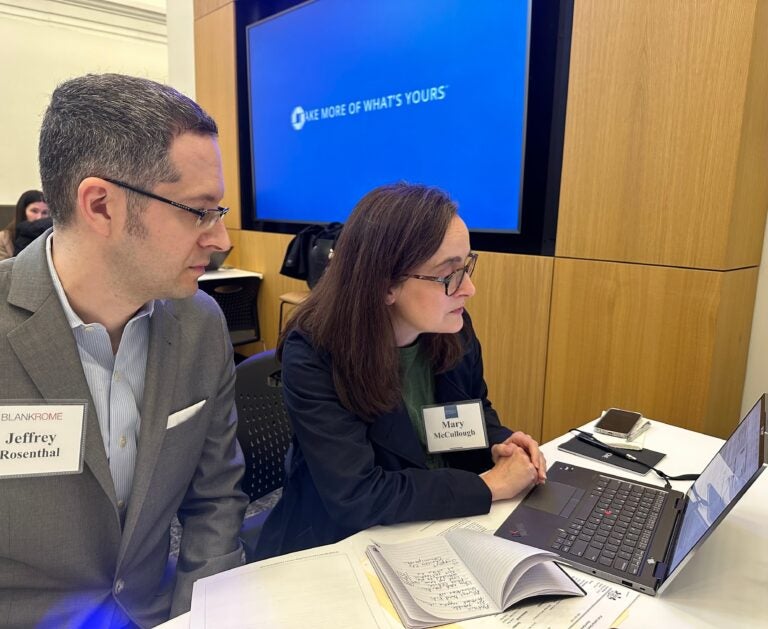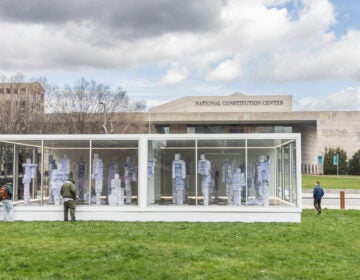Why a business coalition wants more employers to overlook criminal records in Philly
Advocates say too much talent is sitting on the sidelines because criminal records are holding some applicants back.

Pro-bono attorneys Jeff Rosenthal, partner at Blank Rome and JPMorgan Chase's Mary McCullough work together on a pardon in West Philadelphia. (Kristen Mosbrucker-Garza/WHYY)
From Philly and the Pa. suburbs to South Jersey and Delaware, what would you like WHYY News to cover? Let us know!
When North Philadelphia native Wallace Peeples was released from prison after 20 years in 2017, he was unsure how to step back into society.
“I’m walking out of the penitentiary, and I’m scared to death,” Peeples said. “I never held a job. I didn’t have [a] degree. I got a GED in prison.”
Few companies were interested in someone with a criminal record, so he became a social media entrepreneur.
“I had to create my own world,” he said.
Seven years later, Peeples is still running a social media business called Wallo267 Overhead Company. In February, he became the chief marketing officer of REFORM Alliance. The New York City-based nonprofit advocates for legislative criminal justice reform and was co-founded by musicians Meek Mill and Jay-Z. Peeples’ memoir is slated to be published in September.
He said talented people like him are often overlooked because they lack a college degree and have a criminal record.
“The place that I come from, there’s a lot of people that if they are given a proper second chance, they will come out here and execute on levels you could never imagine,” he said.
That’s what the national Second Chance Business Coalition is trying to do. It has 50 companies as members, including media companies like NBCUniversal — which is owned by Comcast — and financial institutions like JPMorgan Chase.
Peeples spoke on a panel during the coalition’s business conference at the Wharton School of Business on Thursday.
There are an estimated 400,000 people in Philadelphia who have a criminal record.
On Wednesday, during a legal clinic inside the JPMorgan Chase Bank branch in West Philadelphia, which doubles as a community center near 52nd and Market Streets, several pro-bono attorneys worked with people trying to clear their criminal records.
It’s the first time the bank has done this in Philadelphia, but it’s not expected to be the last.
“It helps unlock economic opportunities for them. When individuals have the opportunity to move on from their records, they can get better jobs and make more money,” said Nan Gibson, executive director of the JPMorgan Chase policy center. “It’s just good for the economy and our communities.”
JPMorgan Chase hired about 3,000 people with criminal records last year, roughly 10% of its workforce. The company doesn’t inquire about a candidate’s criminal record until a conditional offer is extended, a practice known as “ban the box,” which refers to the box where applicants check whether they have a record on a job application.
“Then we do an individualized assessment,” Gibson said. “Making sure that whatever may be in their past isn’t relevant to the job that they’re being hired to do.”
Philadelphia also has a fair criminal record screening standards ordinance, which prohibits employers from inquiring about criminal history on job applications.
The West Philadelphia legal clinic focused on individuals seeking pardons for their crimes, which requires approval from the governor.
The process for a pardon can take years, but it’s worth the wait, said Jeff Rosenthal, attorney with Blank Rome who volunteered at the legal clinic.
“It can change a person’s life,” he said. The success rate is very high. It opens doors for new opportunities, higher-paying positions, education, and housing opportunities.”
A second clinic meant for individuals seeking expungements is scheduled for April 29 at Delaware State University. The event doubles as a job fair with employers interested in offering second chances to those with criminal records.
Jason Whyte, chairman of the Philadelphia-based nonprofit National Reentry Workforce Collaborative, said that for businesses considering hiring people with criminal records, he recommends connecting to local community organizations that offer social services to ensure a smooth transition.
Manufacturers have long been supportive of hiring individuals with criminal records, he said.
“This is actually a pretty valuable field for individuals to get employed initially many times starting at the entry level but having opportunities to advance,” Whyte said.
The Clean Slate Law, passed in 2018, automatically sealed records for 1.2 million Pennsylvania residents.

Get daily updates from WHYY News!
WHYY is your source for fact-based, in-depth journalism and information. As a nonprofit organization, we rely on financial support from readers like you. Please give today.







